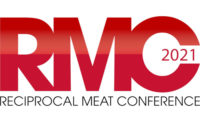AMSA announces symposium speakers on Poultry to Pork — Lessons Learned with Salmonella

AMSA announced that Ms. Kendra Waldbusser, Dr. Martin Wiedmann and Dr. Dayna Harhay will be the featured speakers in the symposium entitled “Poultry to Pork — Lessons Learned with Salmonella” on Tuesday, August 17, 2021, during the 74th AMSA Reciprocal Meat Conference (RMC) at Grand Sierra Resort and Casino in Reno, Nevada, USA. This session will be sponsored by Smithfield Foods.
Kendra Waldbusser, Head of Food Safety and Quality Assurance at JBS Pilgrim's Pride, will kick off this technical session with an overview of “Current Broiler Chicken Practices and How They can Potentially Apply to the Pork Industry in the U.S.” In the U.S., the broiler chicken industry has been working with USDA performance standards for Salmonella for over 25 years. In her talk, Waldbusser will briefly discuss learnings the U.S. broiler industry has had including baseline sampling, development of performance standards, categories of performance, modernization of inspection, intended use of products, and more that might apply to the U.S. pork industry.
Gellert Family Professor in Food Safety at Cornell University, Wiedmann will continue with a talk titled “Whole Genome Sequencing Based Insights on Salmonella and How to Translate Them to Improve Control.” Whole genome sequencing (WGS) has become the standard method used by U.S. regulatory and public health agencies to characterize all human and food-associated Salmonella isolates with deposition of WGS data into the publicly available Pathogen Detection database. Wiedmann will outline challenges and opportunities of WGS-supported risk-based approaches to Salmonella control, specifically how risk-based classification of Salmonella could be used to improve Salmonella performance standards to focus on public health outcomes.
Harhay, USDA Agriculture Research Service Microbiologist will conclude this session discussing “Strategies for a Risk-Based Approach to Controlling Salmonella Contamination in Meat.” Salmonella enterica is a leading agent of gastrointestinal illness in the U.S. and worldwide. Infections and outbreaks attributed to Salmonella result from the interplay of a number of factors including transmission vector, contamination level, and Salmonella pathogenicity level. Accordingly, mitigation strategies for controlling Salmonella contamination in foods should include quantitative assessments of contamination level and pathogenicity level. In this presentation, Harhay will cover overall strategies as well as new methods for capturing data on the level of risk associated with Salmonella contamination in meat.
AMSA is an organization recognized for its unmatched competence and commitment to attracting and developing meat industry leaders and providing science-based meat research and information. For more information, please visit www.meatscience.org/rmc or contact Deidrea Mabry 1-800-517-AMSA ext. 12.
Source: AMSA
Looking for a reprint of this article?
From high-res PDFs to custom plaques, order your copy today!





